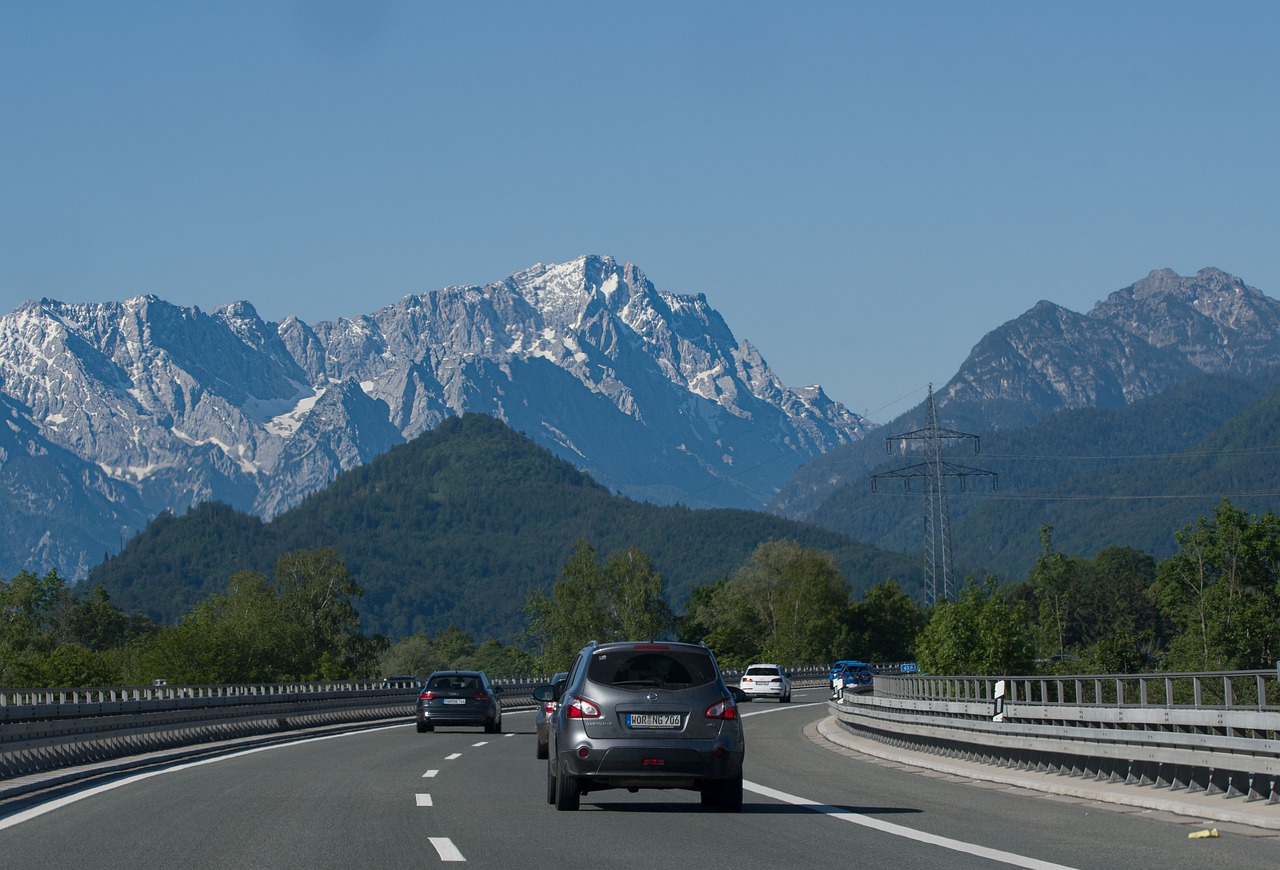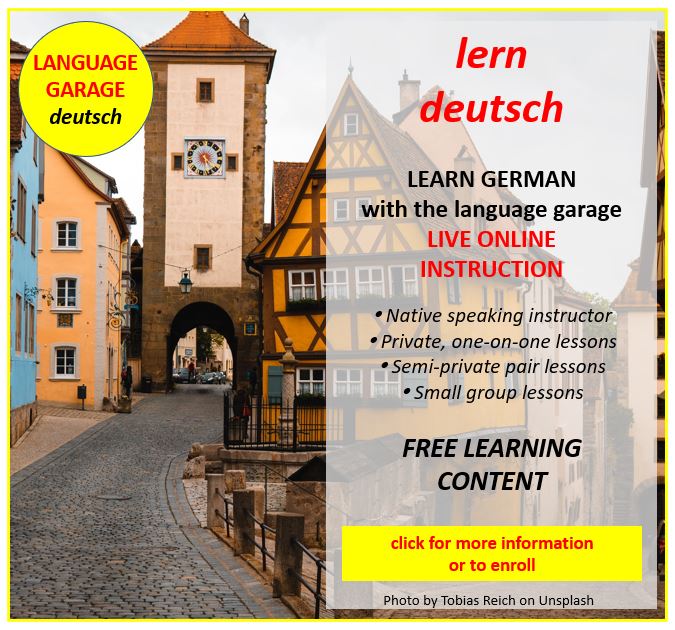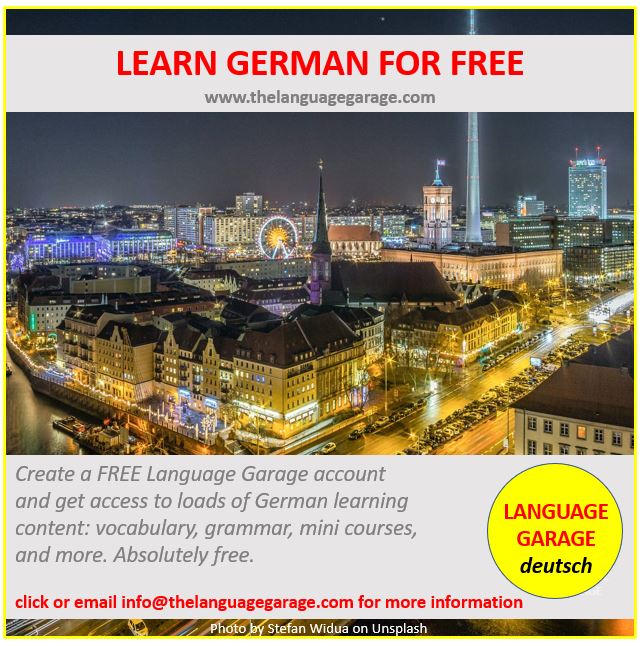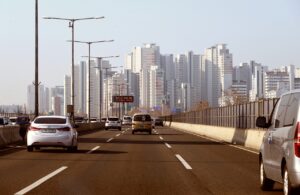Image by Max Julius Walter from Pixabay
In this post we’ll look at some German vocabulary related to cars and driving.
Mein Auto My car
Let’s start with some basic vocabulary: das Auto, -s (car), fahren (to drive), das Benzin/Diesel (gas/petrol), (Benzin) tanken (to get gas), volltanken (to fill the gas tank), der Sicherheitsgurt, -e (seatbelt), die Garage, -n (garage), das Auto/den Motor anlassen (to start the car), (das Auto) parken (to park the car), der Parkplatz, -¨e (parking lot/space), den Motor abstellen (to turn off the engine).
- Hast du/Haben Sie ein Auto?
Do you have a car? - Ich habe ein neues Auto gekauft.
I bought a new car. - Ich fahre jede Woche viel.
I drive a lot every week. - Schnall dich an.
Put on your seatbelt. - Ich muss tanken.
I need to get gas. - Einmal volltanken, bitte.
Fill the tank, please. - Parkst du in einer Garage/einem Parkhaus oder auf der Straße?
Do you park in a garage (private/public) or on the street? - Ich kann keinen Parkplatz finden.
I can’t find a parking space.
Mach die Autotür auf! Unlock the car door!
Now let’s look at some vocabulary for parts of a car. die Autotür, -en (car door), die Windschutzscheibe, -n (windshield), die Scheibenwischer (windshield wipers), das Fenster hochrollen/runterrollen (to put up/down the window), der Kofferraum (trunk/boot), die Kühlerhaube (hood/bonnet), das Lenkrad (steering wheel), der Vordersitz, -e (front seat), der Rücksitz, -e (back seat),die Scheinwerfer (headlights), die Bremsen (brakes), der Motor, -en (engine), der Blinker (blinker, turn signal), die Bremslichter (brake lights), das Öl wechseln (to change the oil), der Mechaniker / die Mechanikerin (mechanic).
- Die Koffer sind im Kofferraum.
The suitcases are in the trunk. - Die Kinder sitzen hinten / auf dem Rücksitz.
The kids are sitting in the back seat. - Es ist kalt! Roll die Fenster hoch und stell die Heizung an.
It’s cold! Put up the windows and turn on the heat. - Es ist warm! Roll die Fenster runter und mach die Klimaanlage an.
It’s hot! Open the windows or put the air conditioning on. - Es regnet. Ich muss die Scheibenwischer anstellen.
It’s raining. I need to put on the windshield wipers. - Es ist dunkel. Ich muss die Scheinwerfer anmachen.
It’s dark. I need to put on the headlights. - Der Motor ist unter der Kühlerhaube.
The engine is under the hood. - Mein Auto braucht neue Bremsen.
My car needs new brakes. - Machen Sie den Blinker an und biegen Sie an der nächsten Straße ab.
Put on your blinker (turn signal) and turn at the next street. - Mein Auto braucht einen Ölwechsel.
I need to change the oil in my car. - Mit meinem Auto ist was nicht in Ordnung. Ich brauche einen Mechaniker.
Something is wrong with my car. I need a mechanic.
Biegen Sie an der Ampel rechts ab.. Turn right at the traffic light.
Now let’s see some vocabulary that describes what we do when we drive. geradeaus fahren (to drive straight), links/rechts abbiegen (to turn left/right), den Rückwärtsgang einlegen (to reverse), schalten (to change gears), die Ampel, -n (traffic light), das Stoppschild, -er (stop sign), die Höchstgeschwindigkeit / das Tempolimit (speed limit), hupen (to honk the horn),
- Du fährst zu schnell. Fahr langsamer!
You’re driving too fast. Slow down! - Du fährst zu langsam. Fahr schneller!
You’re driving too slowly. Speed up! - Was ist das Tempolimit?
What is the speed limit? - Biegen Sie an der nächsten Ampel links ab.
Turn left at the next traffic light. - Da steht ein Stoppschild! Halt an!
There’s a stop sign! Stop! - Warum hupt der?
Why is he honking his horn? - Sie ist im Rückwärtsgang aus dem Parkplatz gefahren und dann weggefahren.
She reversed out of the parking spot and drove away.
auf der Straße On the road
Now let’s look at some things you’re likely to see when you’re on the road. die Straße, -n (street), die Autobahn (highway), die (Autobahn)abfahrt, -en (highway exit), auf die Autobahn fahren (to get on the highway), die Mautstelle (toll booth), die Brücke, -n (bridge), das Verkehrsschild, -er (road sign), der Kreisverkehr (traffic circle/roundabout), der Lastwagen; der Lkw (Lastkraftwagen) (truck), überholen (to pass a car), die Spur, -en (lane), die Tankstelle, -n (gas station), der Stau (traffic jam), bis X ist es eine Stunde/sind es zwei Stunden Fahrt (to take one hour/two hours to drive to X.)
- Wie komme ich zur Autobahn?
How do I get to the highway? - Fahr an der nächsten Abfahrt runter (von der Autobahn).
Get off the highway at the next exit. - Nach der Brücke kommt eine Mautstelle.
There’s a toll booth after the bridge. - Was steht da auf dem Schild?
What does it say on that sign? - Wo ist die nächste Tankstelle?
Where is the nearest gas station? - Das Auto da fährt so langsam. Überhol den mal.
This car is driving very slowly. Let’s pass him. - Wechsel noch nicht die Spur, da ist ein Lastwagen hinter dir.
Don’t change lanes yet, there’s a truck behind you. - Um diese Tageszeit ist der Verkehr echt schrecklich.
Traffic is really bad this time of day. - Wir stecken im Stau.
We’re stuck in a traffic jam. - Wie lange dauert die Fahrt zum Flughafen?
How long does it take to drive to the airport?
Ich habe einen Platten. I have a flat tire.
Sometimes things don’t always go perfectly well when we drive. falsch abbiegen (to make a wrong turn), sich verfahren (haben) (to be lost), einen Platten haben (to have a flat tire), kein Benzin mehr haben (to be out of gas), einen Unfall haben (to have an accident), eine Vollbremsung machen (to slam on the brakes), ausweichen (to swerve), rutschen, schlittern (to slide), rutschen, schleudern (to skid), eine leere Batterie (a dead battery), vor einen Baum fahren / mit einem anderen Auto zusammenstoßen (to hit a tree/another car), einen Strafzettel bekommen (to get a ticket).
- Ich bin falsch abgebogen. Wir haben uns verfahren.
I made a wrong turn. We’re lost. - Wir haben einen Platten.
We have a flat tire. - Wir haben einen leichten Unfall gehabt.
We had a minor accident. - Der Fahrer/Die Fahrerin vor mir hat eine Vollbremsung gemacht.
The driver ahead of me slammed on his/her brakes. - Ein Hund ist auf die Straße gelaufen und ich bin ausgewichen, um ihn nicht anzufahren.
A dog ran into the road, and I swerved to avoid it. - Die Straßen sind vereist, daher schlittert das Auto.
The roads are icy, so the car is sliding. - Wir sind gerutscht und dann zum Stillstand gekommen.
We skidded to a stop. - Das Auto springt nicht an. Die Batterie ist leer.
The car won’t start. The battery is dead. - Ich bin vor einen Baum gefahren.
I hit a tree. - Ich bin mit einem anderen Auto zusammengestoßen.
I collided with another car. - Ich bin gerast und habe einen Strafzettel bekommen.
I was speeding and got a ticket.
Taxi! Taxi!
Here are some vocabulary items and expressions that you can use for public transportation. das Taxi-, -s (taxi), der Bus, -se (bus), das Fahrgeld (fare), der Taxistand (taxi stand), die Bushaltestelle, -n (bus stop), in den Bus einsteigen (to get on the bus), aus dem Bus aussteigen (to get off the bus).
- Wo kann ich ein Taxi bekommen?
Where can I get a taxi? - Zum Bahnhof, bitte.
(I would like to go) To the train station, please. - Fahren Sie mich bitte zu dieser Adresse.
Please take me to this address. - Wieviel kostet die Fahrt?
How much is the fare? - Halten Sie bitte hier.
Please stop here. - Geht/fährt ein Bus vom Flughafen zur Stadtmitte/zum Zentrum?
Is there a bus from the airport to the city center? - An der nächsten Haltestelle steigen wir aus.
We get off at the next stop.
Wo kann ich ein Auto mieten? Where can I rent a car?
Let’s close with some vocabulary and expressions that you can use when renting a car. ein Auto mieten (to rent a car), zweitürig, viertürig (two-door, four-door), der Vierradantrieb (four-wheel drive), das Automatikgetriebe (automatic transmission), das Handschaltgetriebe (manual transmission), die Versicherung (insurance), der Führerschein (driver’s license), das Auto abholen (to pick up the car), das Auto zurückbringen (to return the car), der Kilometerstand (kilometrage limit).
- Wir würden gern ein Auto mieten.
We would like to rent a car. - Wir hätten gern ein zweitüriges/viertüriges Auto, bitte.
We would like a two-door/four-door car please. - Wir benötigen ein Fahrzeug mit Vierradantrieb.
We need a four-wheel drive vehicle. - Ist Ihnen (ein) Automatik- oder Handschaltgetriebe lieber?
Do you prefer automatic or manual transmission? - Hier ist mein Führerschein.
Here is my driver’s license. - Wieviel Versicherung ist dabei inklusive?
How much insurance is included? - Was ist die tägliche Kilometerbegrenzung?
What is the daily kilometrage limit? - Kann ich das Auto am Flughafen abholen/zurückbringen?
Can I pick up/return the car at the airport?
Do you want to learn German?
Check out our other posts on German language, culture, and more. And if you’re looking for convenient and affordable live German lessons with a real teacher, check out The Language Garage German. Our lessons are given online in a virtual classroom, so it doesn’t matter where you live or work. We can come to you. And we have flexible options, with a free trial so that you can decide if there’s a fit. Check us out!






